François-René de Chateaubriand
Itinéraire de Paris à Jérusalem et de Jérusalem à Paris
(Record of a Journey from Paris to Jerusalem and Back)
Translated by A. S. Kline © Copyright 2011 All Rights Reserved
This work may be freely reproduced, stored and transmitted, electronically or otherwise, for any non-commercial purpose. Conditions and Exceptions apply.
Part Two: The Archipelago, Anatolia and Constantinople
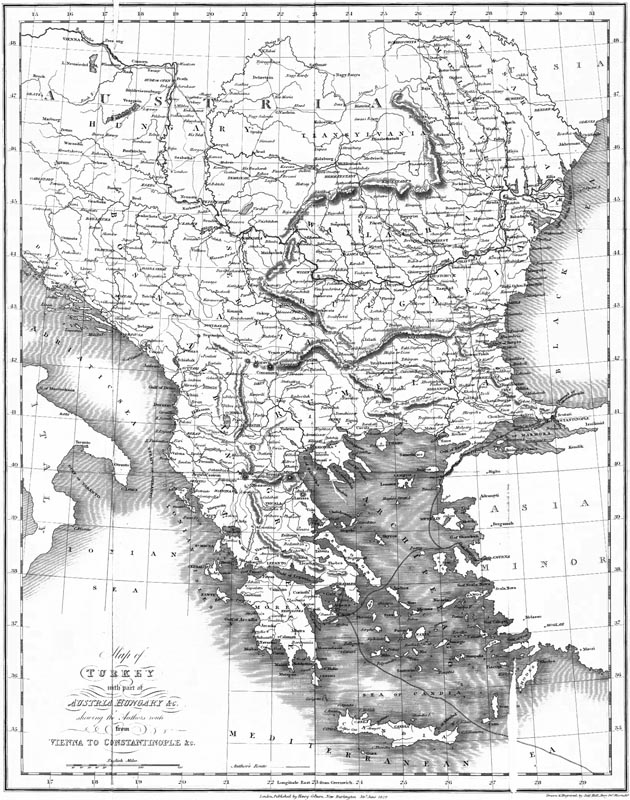
‘Map of Turkey’
Travels to and from Constantinople in the years 1827 and 1828 - Charles Colville Frankland (1829)
The British Library
I entered on a change of scene: the islands I was about to voyage through were, in ancient times, a kind of bridge over the sea linking Greek Asia Minor to the true Greece. Free or dependent, tied to the fortunes of Sparta and Athens, the destiny of Persia, the fate of Alexander and his successors, they fell under the Roman yoke. Attached to the Later Empire by, in turn, the Venetians, Genoese, Catalans, and Neapolitans, they had their own princes, and even dukes, who took the overall title of the Dukes of the Archipelago. Finally, the sultans of Asia Minor descended on the Mediterranean; and as if to proclaim its future destiny, they took away sea-water, sand and an oar (see the Battle of Hyelion c1177). The islands though last to be subdued finally suffered the common fate, and the Latin banner, driven hither and thither by the Crescent, only halted on the shores of Corfu.
This struggle of the Greeks, Turks and Latins resulted in the islands of the archipelago becoming well known in the Middle Ages; they lay along the path followed by all the flotillas of soldiers or pilgrims sailing to Jerusalem, Constantinople, Egypt, and the Barbary Coast; they became ports of call for all those vessels which revitalized Genoese and Venetian trade with India via the port of Alexandria; one also finds the names of Chios, Lesbos, Rhodes, on every page of La Byzantine (Charles du Fresne’s: Historia Byzantina 1680) and while Athens and Sparta were forgotten, we know the fortunes of the smallest reef of the Archipelago.
Moreover, the voyages to these islands are numerous, and date as far back as the seventh century: there is not a pilgrimage to the Holy Land begins without a description of some Greek cliff. In 1553 Belon (Pierre Belon) published, in French, his Observations de plusieurs singularités retrouvées en Grèce (revised 1555); Tournefort’s Voyage du Levant (Joseph Pitton de Tournefort, 1718) is in everyone’s hands; the Description exacte des îles de l’Archipel by the Fleming, Dapper (Olfert Dapper, 1703), is an excellent work; and everyone has seen Monsieur de Choiseul’s prints.
Our voyage was fortunate. On the 30th of August at eight in the morning, we entered the harbour of Zea: it is vast, though its aspect is desolate and sombre, because of the high cliffs which surround it. On the rocky shore, only a few ruined chapels and customs warehouses are to be seen. The village of Zea is built on the mountain, three miles east of the harbour, and occupies the site of ancient Carthea. On arrival I could only see three or four Greek feluccas, and gave up all hope of meeting with my Austrian vessel. I left Joseph at the harbour, and went up to the village with the young Athenian. The ascent is rugged and wild: my first sight of an island of the Archipelago failed to charm me overmuch; but I was accustomed to disappointment.
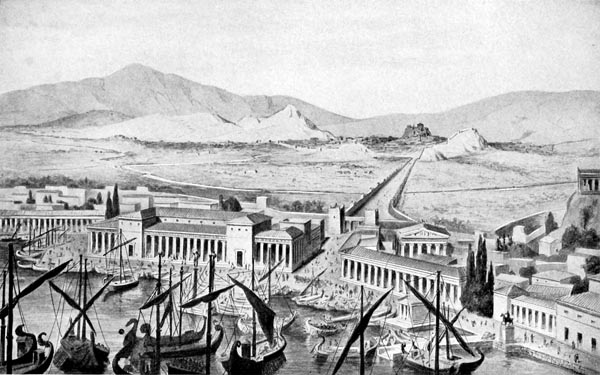
‘The Piraeus and the Long Walls of Athens (A Restoration by Thiersch)’
The Eastern Nations and Greece - Philip Van Ness Myers (p272, 1917)
Internet Archive Book Images
Zea, built like an amphitheatre on an uneven mountain slope, is merely untidy and unpleasant but quite well-populated; donkeys, pigs, and chickens dispute your passage of the streets; there are such a vast multitude of roosters there, and they crow so often and so loudly, that it is truly deafening. I went to see Monsieur Pengali, the French Vice-Consul in Zea; and I told him who I was, where I came from, and where I wanted to go, and begged him to charter a boat to take me to Chios or Smyrna.
Mr. Pengali received me with the greatest possible cordiality: his son went down to the harbour; there he found a caique which was returning to Tinos, and was due to set sail the next day; I decided to take advantage of it: it would take me a little further on my way.
The Vice-Consul offered me hospitality, at least for the rest of the day. He had four daughters, and the eldest was about to marry; they were already preparing for the wedding; thus I passed from the ruins of the Temple of Sunium to a feast. The traveller’s fate is a singular one. In the morning he leaves one host in tears, by nightfall he joyfully discovers another; he becomes the repository of a thousand secrets: in Sparta Ibrahim told me all the details of his Turkish child’s illness; at Zea I learned the history of Monsieur Pengali’s son. Truly, is there anything more delightful than simple hospitality? Are you not happy indeed that someone desires to welcome you warmly thus, to places in which you would fail to obtain the least assistance? The confidences you inspire, the openness of heart revealed to you, the pleasure you seem to give, and indeed do give, are the sweetest of pleasures. Another thing moved me still more; it was the simple trust they showed in charging me with various commissions to France, Constantinople, and Egypt. I was asked to do them a service just as they performed mine; my hosts were convinced I would not forget, and that they were my friends. I at once relinquished the ruins of Ioulis, which I had initially determined on seeing, in favour of Monsieur Pengali, and determined, like Ulysses, to take part in Aristonous’ feast (see Fénelon: Les Aventures D’Aristonous, 1699)
Zea, the former Ceos, was famous in antiquity for a custom which also existed among the Celts, and which is found among the savages of America: the old men of Ceos put themselves to death. Aristaeus, whose bees Virgil celebrated (Georgics IV. 554), or another Aristeas, the King of Arcadia, retired to Ceos. It was he who obtained the Etesian winds from Zeus, to moderate the heat of the dog-days. Erasistratus the physician and the philosopher Ariston were from the city of Ioulis, as were Simonides and Bacchylides: there is a deal of bad poetry by the latter in the Poetae Graeci Minores. Simonides was a true genius, though his mind was nobler than his heart. He sang of Hipparchus, who bestowed many favours on him, and again he sang the murderers of that prince. It was apparently to set this example of virtue that the just gods of paganism saved Simonides from a falling house (Cicero: De Oratore 2.86.353). One must accommodate oneself to one’s times, said that wise man: the ungrateful soon shake off their feelings of gratitude, the ambitious abandon the defeated, and the cowards join the winning side. Wondrous human wisdom, whose maxims, always superfluous to courage and virtue, serve merely as a pretext for vice, and a refuge for cowardly hearts!
Zea’s commerce now consists of acorns from the velanidia (oak-tree) which are used in dyes. The silk fabric in use among the ancients was invented in Ceos (I am of the common opinion, but it is possible that Pliny and Solinus were mistaken. According to the testimony of Tibullus, Horace, etc., silk fabric was fashioned in Cos, and not Ceos); the poets, to illustrate its transparency and delicacy, called it the fabric of the wind. Zea still produces silk: ‘The citizens of Zea usually gather together to spin silk,’ Tournefort says (Voyage du Levant, Amsterdam, 1718 p.129), ‘and they sit on the edges of their terraces, in order to let their spindles drop down to the street, then draw them back while winding the thread. We found the Greek Bishop amongst them: he asked who we were, and told us that our occupation was very frivolous, if we merely sought plants and old marble. We said we would be more edified to see him handling the works of Saint Chrysostom or Saint Basil than a spindle.’
I had continued to take quinine three times a day: the fever had not returned, but I remained very weak, and my hand and one cheek were still badly sunburned. So I was a guest with a very light heart, but cutting a very sad figure. So as not to look like an unhappy relative, I enjoyed myself at the wedding. My host offered me an example of courage: he was suffering at this moment from a cruel illness (Monsieur Pengali was unfortunately suffering from gallstones); and in the midst of his daughters’ singing, the pain sometimes made him cry out. All this made for an extremely odd mixture; the sudden transition from the silence of ruins to the noise of a marriage felt strange. So much commotion at the gates of eternal rest! So much joy after the general grief of Greece! One idea made me laugh: I imagined my friends in France thinking of me, I saw them following me in imagination, exaggerating my weariness, troubled by my peril: they would have been astonished if they could suddenly have caught sight of me; my face half-burned, attending a village wedding in the Cyclades, applauding the Mademoiselles Pengali’s songs, as they chanted in Greek:
Ah! Vous dirai-je, maman, etc.
Oh! I’ll tell you, mama, etc.
(A French nursery rhyme, c1761, the tune is ‘Twinkle, twinkle, little star’. Mozart’s variations on its theme form K. 265/300e)
While Monsieur Pengali vented his groans, the roosters crowed themselves hoarse, and all thoughts of Ioulis, Aristeas, and Simonides, were completely erased. It is thus, that in landing later in Tunis, after a passage of fifty-eight days, which was a kind of continuous shipwreck, I descended on Monsieur Devoise (Jacques-Philippe Devoise, the French Consul) in the midst of a carnival; instead of going off to meditate on the ruins of Carthage, I was obliged to hasten to a ball, to dress in Turkish clothes, and lend myself to all the follies of a troop of American officers, filled with youth and gaiety.
The change of scene, on my departure from Zea, was as abrupt as it had been on my arrival in that island. At eleven at night, I left the happy family: I went down to the harbour; I embarked in the darkness, in bad weather, in a caique whose crew consisted of two ship’s boys and three sailors. Joseph, very courageous on dry land, was not so brave at sea. He made many pleas to me in vain: he had to follow me and attend my path of fate. We cast off; our skiff, bowed over by its weight of the sail, was awash, and the shock of the waves was violent; the currents from Euboea made the seas rougher still; the sky was overcast; we sailed to the accompaniment of lightning flashes and the phosphorescence of the breakers. I have no wish to boast of my troubles, which were very slight; yet I hope that when you see me torn from my country and my friends, enduring fever and fatigue, crossing the seas of Greece in small boats, suffering rifle-fire from the Bedouin, and all this out of respect for the public, and in order to offer the public a less imperfect work than the Spirit of Christianity (Le Génie du Christianisme), I hope, I say, my efforts will gain some appreciation.
Despite the popular fable of the Eagle and the Raven (La Fontaine: Le corbeau voulant imiter l’aigle), there is no finer happiness than to imitate a great man, I had played Caesar: Quid times? Caesarem vehis: Why fear? You bear Caesar: (a Latin translation of Plutarch: Caesar:38.5); and arrived where I wished to be. We touched at Tinos on the 31st of August at six in the morning; at that very instant, I perceived a Hydriot felucca bound for Smyrna, which merely needed to stop at Chios for a few hours. The caique set me on board the felucca, without my even setting foot on land.
Tinos, once Tenos, is only separated from Andros by a narrow channel: it is a lofty island resting on a rock composed of marble. The Venetians held it for a long time; it was only famous in antiquity for its snakes: a species of viper takes its name from the island (A kind of viper named taenia originally came from Tenos. The island was once called Ophiussa, or Hydroessa, because of its snakes). Monsieur de Choiseul has made a charming drawing of the women of Tinos, his views of the harbour of San-Nicolo struck me as of rare accuracy (1782, extant).
The sea, as sailors say, had fallen, and the sky had cleared; I lunched on the deck until we weighed anchor, I could see all the Cyclades at various distances: Scyros where Achilles spent his childhood; Delos, famous for the birth of Diana and Apollo, its palm-tree, and its festivals; Naxos, which recalled Ariadne, Theseus, Dionysus, and some charming pages of the Studies of Nature (Études de la Nature, Bernardin de Saint-Pierre, 1784). But all these islands, whether smiling once, or perhaps embellished by the imagination of poets, only offer today, arid and desolate coastlines. Sad egg-shaped villages rose, above the cliffs; they were overlooked by yet sadder castles, sometimes enclosed by double or triple walls: they live in perpetual fear of the Turks and the pirates. As these fortified villages, however, fall into ruin, they give rise, at once, in the traveller’s mind to thoughts of untold misery. Rousseau says somewhere that he would have liked to have been exiled to an island in the Archipelago. The eloquent sophist would soon have repented of his choice. Separated from his admirers, relegated to the company of coarse and treacherous Greeks, he would have found, in valleys scorched by the sun, neither flowers, nor streams, nor shade; he would have seen around him only clumps of olive-trees, and reddish rocks, covered with wild sage and balsam: I doubt he would have liked to continue his walks for long, to the sound of wind and sea, along an uninhabited shore.
We set sail at noon. The north wind carried us fairly quickly to Chios, but we were obliged to tack between the island and the coast of Asia Minor, in order to enter the channel. We saw headlands and islands all around us, some round and tall like Samos, others long and low like the capes of the Gulf of Ephesus: the headlands and islands were variously coloured, depending on their degree of remoteness. Our felucca, very light and elegant, carried a large and unusual sail, shaped like the wing of a sea-bird. This little vessel was owned by a single family: the family consisted of father, mother, brother and six sons. The father was the captain; the brother, the pilot; and the sons were the sailors: the mother prepared the meals. I have not seen any crew happier, neater or sprightlier than this crew of brothers. The felucca was washed, cared for, and adorned like a beloved dwelling; she had a large rosary on the stern, with a picture of the Panagia surmounted by an olive branch. In the Orient, it is quite a common thing to see a family invest their entire fortune in a boat, experience a change of scene without leaving their home, and escape slavery by leading, at sea, the life of Scythians.
We anchored for the night at Chios, ‘the fortunate land of Homer,’ as Fénelon said in Les Adventures d’Aristonous, a masterpiece of harmony and classical taste. I was deeply asleep, and Joseph did not wake till seven in the morning. I was lying on the deck; when I opened my eyes, I felt I had been transported to the land of faerie. I found myself in the midst of a harbour full of vessels, a delightful town before me, overlooked by mountains whose ridges were covered with olive-trees, palm-trees, mastics (pistacia lentiscus) and turpentine trees (pistacia terebinthus). A crowd of Greeks, Frenchmen and Turks were scattered about the docks, and we could hear the sound of bells (It is only the Greek peasants on Chios who have, among the Turks, the privilege of bell-ringing. They owe this privilege and several others to their cultivation of mastic. See the note by Monsieur Galland, in Monsieur de Choiseul’s work.)
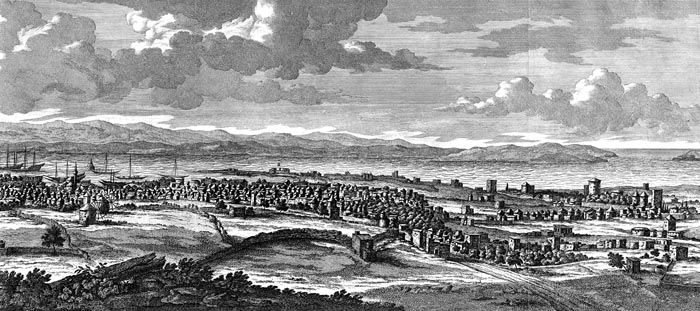
‘View of the Town on the Island of Chios’
Jan Luyken, Pieter Schenk (I), Cornelis de Bruyn, 1698
The Rijksmuseum
I went ashore, and enquired whether there was a consul of our nation on the island. They directed me to a surgeon who dealt with the affairs of France: he lived by the harbour. I went to visit him; he received me very politely. His son acted as my cicerone for a few hours, as I viewed the town, which is much like a Venetian town. Baudrand (Michel Antoine Baudrand), Ferrari (Filippo Ferrari), Tournefort, Dapper, Chandler, Monsieur de Choiseul, and a thousand other geographers and travellers have spoken of the island of Chios: I refer the reader to their works.
I returned to the felucca at ten; I breakfasted with the family: they sang and danced on the deck around me, drinking the wine of Chios, which was not that of the days of Anacreon. A not too harmonious instrument animated the steps and voices of my hosts; the ancient lyre has only been retained in name, and has degenerated like its masters: Lady Craven (Elizabeth, Baroness Craven) has described it.
We left port on the 1st of September, at noon; the north wind began to rise, and quickly became quite violent. We tried first to take the western passage between Chios and the Spalmodores (now Oinousses) Islands, which block the channel when one sails for Metelin (the port at Lesbos) or Smyrna. But we could not double Cape Delphini: we wore to the east, and sailed along the coast to the harbour of Tschesme (Cesme, Turkey). From there, returning to Chios then heading towards Mount Mimas, we finally succeeded in reaching Cape Cara-Bouroun (Karaburun), at the entrance to the Gulf of Smyrna (Gulf of Izmir). It was ten at night: the wind failed us, and we spent the night becalmed off the coast of Asia Minor.
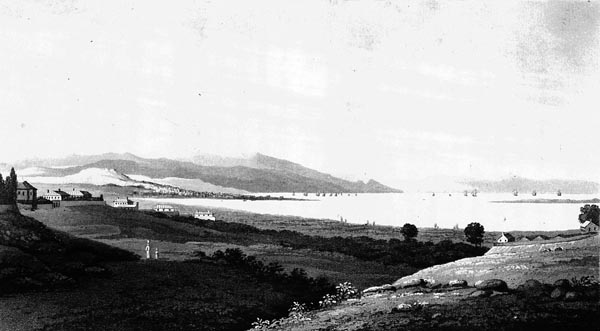
‘Distant View of the Bay and City of Smyrna’
Travels to and from Constantinople in the years 1827 and 1828 - Charles Colville Frankland (p318, 1829)
The British Library
On the 2nd of September, at daybreak, we set sail, to take advantage of the imbat (a cool dry northerly wind) as soon as it began to blow: it appeared at an earlier hour than usual. We soon passed the islands off Dourlach (Urla), and skimmed past the castle which commands the end of the gulf or the harbour of Smyrna. I then saw the city in the distance, through a forest of masts: it seemed to rise from the sea, as it is placed on a low flat site, which overlooks a mountain range of barren aspect to the southeast. Joseph was beside himself with joy. Smyrna was a second home to him: this poor lad’s pleasure almost affected me, first by making me think of my own native land, then by showing me that the axiom, Ubi bene, ibi patria: where I am happy, there is my country, is only too true for most men.
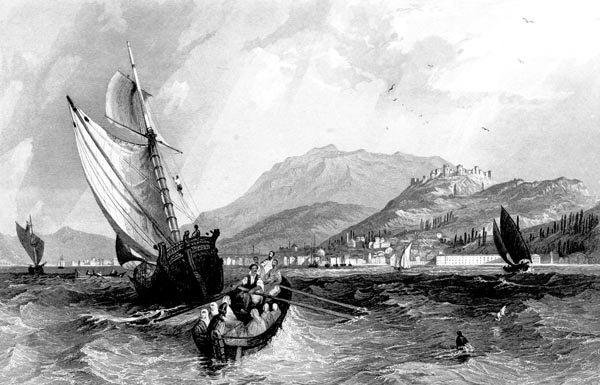
‘Smyrna’
Syria, the Holy Land, Asia Minor - John Carne, Thomas Allom, William Henry Bartlett, William C. Stafford (p516, 1861)
The British Library
Joseph, standing beside me on the deck, named for me everything I saw, as we advanced. Finally, we struck sail, and leaving our felucca to run on for a while, cast anchor in six fathoms, beyond the first line of vessels. I looked for my boat to Trieste, and recognized its flag. It was anchored near the French steps, or European wharf. I embarked, with Joseph, in a skiff that came alongside, and was transported to the Austrian vessel. The captain and his second-in-command were ashore; the sailors recognized me and greeted me joyfully. They told me the boat had arrived in Smyrna on the 18th of August; that the captain had tacked for two days between Zea and Cape Sunium, so as to wait for me; and that the wind had then forced him to continue his journey. They added that my servant, by order of the French Consul, had arranged accommodation for me at the inn.
I saw with pleasure that my former companions had been as fortunate as I had in their journey. They wanted me to set foot on land, so I climbed into the boat’s skiff, and we soon reached the quay. A crowd of porters hastened to give me a hand in climbing ashore. Smyrna, where I saw a multitude of hats (the turban and the hat form the main distinction between the Turks and the French and, in the language of the Levant, one counts hats and turbans), had the look of a seaside town in Italy, an area of which was populated by Orientals. Joseph took me to Monsieur Chauderloz’s residence, which served as the French Consulate in this vital port. I have often repeated my praise of the hospitality I received from our consuls; I beg my readers to forgive me: for though these repetitions are wearisome to them, I however cannot avoid being grateful. Monsieur Chauderloz, the brother of Monsieur de la Clos, received me politely; but did not offer me lodging, because he was ill, and moreover Smyrna possesses the resources of a major European city.
We arranged the rest of my journey on the spot: I had resolved to travel to Constantinople overland, to obtain firmans, and then embark with the Greek pilgrims journeying to Syria; but I preferred not to follow the direct route, and my plan was to visit the plains of Troy by crossing Mount Ida. Monsieur Chauderloz’s nephew, who had just travelled to Ephesus, told me that the gorges of Gargarus (the Turkish Mount Ida) were infested with robbers, and held by aghas that were more dangerous than brigands. As I held to my plan, they sent for a guide who had been hired to conduct an Englishman to the Dardanelles by the route I wished to take. This guide agreed, in fact, to accompany me and provide the necessary horses, for a considerable sum of money. Monsieur Chauderloz promised to loan me an interpreter and a tried and proven Janissary. I then realised that I would be forced to leave some of my luggage at the consulate and content myself with the bare necessities. The day of departure was fixed for the 4th of September, that is to say two days after my arrival at Smyrna.
After promising Monsieur Chauderloz to return to dine with him, I went to my inn, where I found Julien, happily established in a very clean apartment, furnished in European fashion. The inn, run by a widow, enjoyed a very fine view of the harbour: I can no longer remember its name. I have nothing to say regarding Smyrna, after the descriptions by Tournefort, Chandler, Peyssonel (Charles de Peysonnel, French Consul at Smyrna 1747-57), Dallaway (James Dallaway, physician to the Porte: Constantinople ancient and modern 1797), and many others, but I can not deny myself the pleasure of quoting a passage from Monsieur de Choiseul’s Voyage:
‘The Greeks, leaving the area of Ephesus called Smyrna, only built villages at the end of the Gulf, which have since borne the name of their original homeland. Alexander sought to gather them together, and had them build a city near the River Meles. Antigonus began this work at his command, and Lysimachus completed it (c.290BC).
A site as fortunate as that of Smyrna’s was worthy of the founder of Alexandria, and was to ensure the prosperity of the town established there. Admitted by the cities of Ionia to share in the benefits of their confederation, the town soon became the centre of commerce for Asia Minor: its wealth attracted all the arts; it was decorated with beautiful buildings and filled with a crowd of foreign visitors, who came to enrich it with the products of their countries, admire its wonders, sing with its poets, and learn from its philosophers. A tuneful dialect lent new charm to that eloquence which appeared an attribute of the Greeks. The beauty of its climate seemed to affect that of its individuals, who offered, to artists, models, by whose aid they made known to the world nature and art, wedded in all their perfection
It was one of these cities that claimed the honour of being the birthplace of Homer: on the banks of the River Meles was shown the place where Critheis, his mother, gave birth to him, and the cavern to which he retired to compose his immortal verse. A monument to his glory, which bore his name, displayed in the midst of the city huge colonnades under which the citizens gathered; lastly, their currency bore his image, as if they recognized as their sovereign the genius they honoured.
Smyrna retained the precious remnants of this prosperity until the epoch when the empire had to fight against the barbarians: it was taken by the Turks; retaken by the Greeks; continually plundered, frequently destroyed. At the start of the thirteenth century, only ruins existed, and also the citadel, which was repaired by the Emperor John III Ducas Vatatzes, who died in 1254; the fortress could not withstand attack by the Turkish princes, of whom it was often the residence, despite the Knights of Rhodes, who, seizing a favourable opportunity (1343), managed to build a stronghold there, and hold it; yet Tamerlane (Timur) in fourteen days (1402) took that place which Bajazet (Bayezid I) had blockaded for seven years.
Smyrna only began to emerge from its ruins when the Turks finally became the masters of the empire: then its situation conferred upon it the advantages that war had lost, it became once more the storehouse of trade for those countries. The people, re-assured, abandoned the mountain-tops and built new houses at the edge of the sea: these modern buildings were constructed utilising marble from the ancient monuments, of which scarcely a fragment now remains; and only the sites of the stadium and theatre are known. One searches in vain for evidence of their foundations, or the sections of wall that apparently lay between the fortress and the location of the current city.’
Earthquake, fire and pestilence have ravaged modern Smyrna, as the barbarians destroyed ancient Smyrna. The last of those scourges I mentioned led to an act of devotion that deserves recognition among the many acts of devotion carried out by missionaries; the story is beyond doubt: it is related by an Anglican minister. Brother Louis of Pavia, of the Order of Récollets (Franciscans), superior and founder of the Saint-Antoine Hospital, at Smyrna, was attacked by the plague: he vowed that, if God preserved his life, he would dedicate it to helping the victims of that pestilence. Miraculously snatched from death Brother Louis fulfilled the terms of his vow. He has cared for innumerable sufferers, and it has been said that he saves about two-thirds of the unfortunates he has treated (See Dallaway. The main treatment used by Brother Louis is to wrap the patient in a shirt soaked in oil).
There was nothing to see in Smyrna, except that River Meles, which nobody knows of, and whose name is disputed by three or four gullies. (Yet Chandler, in his Travels in Asia Minor Chapter XX, gives a rather poetic description, having elsewhere mocked at poets and painters who provided the Ilissus with water. He finds the Meles flowing behind the castle. Monsieur de Choiseul’s map of Smyrna also marks the river, whose river-god was Homer’s father. How is it that with all the imagination attributed to me I failed to see, in Greece, what so many illustrious and serious travellers have seen? I have a confounded love of truth, and a fear of saying what is not, that in me outweighs all other considerations).
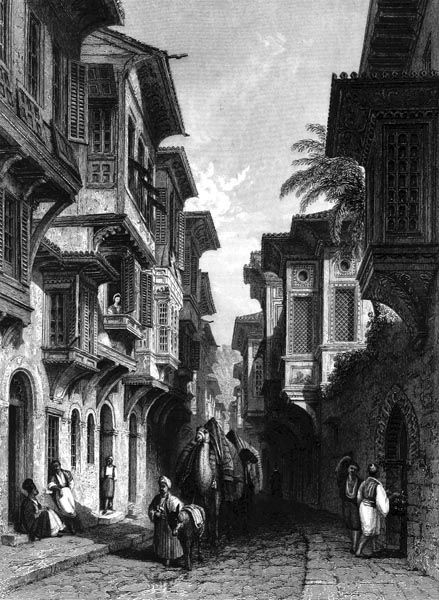
‘A Street in Smyrna’
Syria, the Holy Land, Asia Minor - John Carne, Thomas Allom, William Henry Bartlett, William C. Stafford (p524, 1861)
The British Library
Yet one thing which struck me, and surprised me, was the extreme mildness of the air. The sky, less clear than that of Attica, possessed the colour which painters call a warm tone; that is to say, it was filled with dispersed vapour a little reddened by the light. When the sea breeze dropped, I felt the onset of a languid weakness: I recognized gentle Ionia. My stay at Smyrna forced me to undergo a fresh transformation; I was obliged to resume the aspects of civilization, to receive and pay visits. Those traders who did me the honour to visit me were wealthy; and when I went to visit their residences in turn, I found elegant women there, who appeared to have received the latest fashions that morning from the House of Leroy (Louis-Hippolyte Leroy). Situated between the remains of Athens and the ruins of Jerusalem, this other Paris which I had reached on a Greek ship, and which I was about to leave with a Turkish caravan, separated the theatres of my journey in a piquant manner: it was a kind of oasis of civilization, a Palmyra in the midst of wildernesses and barbarities. I confess, however, that being somewhat uncivilised by nature, it was not what we call society that I had come to the East to seek: I longed to see camels and hear the cry of the mahout (elephant-driver).
On the 5th of September, in the morning, all the arrangements having been made, the guide departed with the horses: he would await me at Menemen-Iskelesi, a small harbour in Anatolia. My last visit in Smyrna was to see Joseph: Quantum mutatus ab illo: how changed he was from himself! (Virgil: Aeneid II: 274) Was this really my illustrious dragoman? I found him in a miserable shop, beating and smoothing his pewter vessels. He had on the same blue velvet jacket he wore amidst the ruins of Sparta and Athens. What use to him were those symbols of glory? What benefit to him in having seen men and cities, mores hominum et urbes? (See Horace, quoting Homer: Ars Poetica, 141) He was not even the owner of the shop! I saw the proprietor, of surly aspect, in a corner, who spoke rudely to my old companion: was this what so delighted Joseph on his arrival! I only regret two things from my voyage: that I was not wealthy enough to establish Joseph at Smyrna, and also to redeem a captive at Tunis. I made my last farewells to the poor fellow: he wept, and I was scarcely less moved. I wrote my name for him on a piece of paper, in which I wrapped sincere tokens of my gratitude, in such a manner that the proprietor of the shop saw nothing of what passed between us.
That evening, after thanking the Consul with due civility, I embarked in a boat with Julien, the dragoman, the Janissaries, and Monsieur Chauderloz’s nephew, who wished to accompany me to Menemen. We were soon on land. The guide was on the shore: I embraced my young host, who returned to Smyrna; we mounted our horses and departed.
It was midnight when we arrived at the Menemen caravanserai. From afar I saw a host of scattered lights: it was the caravan at rest. As we approached, I made out the camels, some lying down, others standing; the latter, carrying their burdens, the former stripped of their baggage. Horses and donkeys, without bridles, ate barley from leather buckets; several riders were still on horseback, and the women, veiled, had not yet descended from their dromedaries. Sitting cross-legged on carpets, Turkish merchants were grouped around the fires, used by the slaves to prepare pilau; other travellers were smoking their pipes at the door of the khan, chewing opium, and exchanging stories. Coffee was roasting in pans; food-sellers roamed from camp-fire to camp-fire, offering cakes made from wheat-flour, fruit, and poultry; singers entertained the crowd; imams made their ablutions, prostrated themselves, rose, invoked the Prophet; camel drivers slept, stretched out on the ground. The dust was strewn with bales, bags of cotton, and panniers of rice. All these objects, some distinct and brightly lit, some confused and drowned in semi-shade according to the colour and movement of the flames, offered a true scene from the Arabian Nights. It only lacked the caliph, Harun al-Rashid, the vizier, Giaffar (Ja’far), and Mesrour, the chief eunuch.
I realised then, for the first time, that I was treading the plains of Asia Minor, a part of the world which had not yet seen my footprints! Nor those sorrows, alas, that I share with all men! I felt imbued with respect for that ancient land where civilisation began, where the patriarchs lived, where Tyre and Babylon rose, where Eternity summoned Cyrus and Alexander, where Jesus Christ accomplished the mystery of our salvation. An alien world opened before me; I would encounter nations unknown to me, other ways of life, other customs, strange creatures, and plants, fresh skies, and new fields of nature. I would soon cross the Hermus and the Granicus; Sardis was not far off; I would journey towards Pergamum and Troy: history would unroll another page of its cycles of human existence for me.
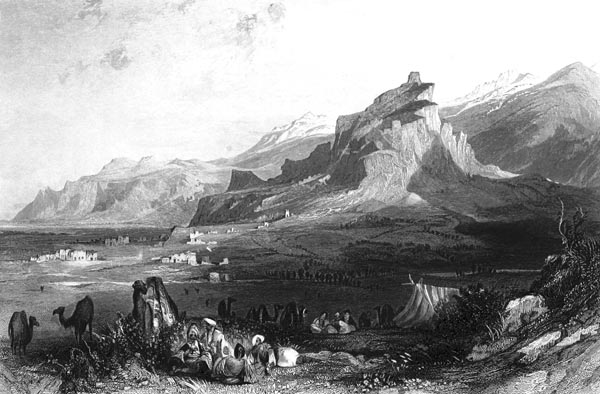
‘Acropolis of Sardis’
Syria, the Holy Land, Asia Minor - John Carne, Thomas Allom, William Henry Bartlett, William C. Stafford (p542, 1861)
The New York Public Library: Digital Collections
I left the caravan behind with great regret. After a two hour ride we reached the banks of the Hermus, which we crossed in a ferry. It is still the turbidus Hermus: the turbid Hermus (Virgil: Georgics II:137). I know not if it yet carries gold within in its flow. I gazed at it with pleasure, since it was the first river, properly speaking, I had encountered since leaving Italy. At daybreak we entered a plain surrounded by low mountains. The countryside offers an aspect quite different from that of Greece: green cotton, yellowing wheat stubble; and the varied hues of watermelons, produced a pleasantly dappled landscape; camels were grazing here and there alongside water buffalo. We left behind us Magnesia and Mount Sipylus (Spil): thus we were not far from those battlefields where Agesilaus humbled the power of the Great King, and where Scipio won the victory over Antiochus that opened to the Romans the road to Asia.
We saw, on our left in the distance, the ruins of Cyme, and we had Neon Tichos to our right: I was tempted to dismount and travel on foot, out of respect for Homer, who had passed through this same region.
‘Some time later, the poor state of affairs led him to travel to Cyme. Setting out, he crossed the plain of the Hermus, and arrived at Neon Tichos, a colony of Cyme: it was founded eight years after Cyme. It is claimed that, in this city, at an armourer’s, he recited these verses, the first he had composed: “O, citizens of this sweet daughter of Cyme, you who live at the foot of Mount Sardine, its summit shaded by trees that spread their coolness, you who drink of the divine Hermus, whom Zeus fathered, pity the misery of a stranger who has no house in which he may find shelter!”
The Hermus flows by Neon Tichos, and Mount Sardine overlooks both. The armourer was named Tychius: these verses pleased him so much he decided to welcome the man to his home. Full of pity for a blind man reduced to begging for his bread, he promised to share with him what he had. Melesigenes (Homer) having entered his workshop, took a seat and, in the presence of a handful of the citizens of Neon Tichos, offered a taste of his poetry: from the expedition of Amphiaraus against Thebes, and the Hymns in honour of the gods. Everyone expressed their sentiments, and Melesigenes having passed judgement on them, his listeners were lost in admiration.
While he was at Neon Tichos, his poetry furnished him with the means of subsistence: even in my time they still showed the place where he used to sit when reciting his poems. This place, which was still held in great reverence, was shaded by a poplar tree which had begun growing at about the time he arrived there’ (from the Vie d’Homère, the Life of Homer by Pseudo-Herodotus: IX-X, translated by Monsieur Larcher).
Since Homer had been the guest of an armourer at Neon-Tichos, I no longer blushed at having as interpreter a pewter-seller from Smyrna. Would to heaven that the resemblance had been as complete in total, and I might have acquired Homer’s genius merely by experiencing all the misfortunes by which the poet was overwhelmed!
After several hours ride, we had passed one of the ridges of Mount Sardine, and reached the banks of the River Pythicus. We halted to allow a caravan that was crossing the river to pass by. The camels, linked by their tails, one to another, resisted entering the water; they stretched out their necks, and were dragged forwards by a donkey walking at the head of the caravan. Merchants and horses halted facing us, on the far side of the river, and a Turkish woman could be seen, seated to one side, hidden behind her veil.
We then crossed the Pythicus, below a wretched stone bridge; and at eleven we reached a khan, where we let the horses rest.
At five in the evening we resumed our journey. The land was elevated, and quite well cultivated. The sea was in sight to our left. I came across Turkoman tents, for the first time: they were made from black sheepskins, which reminded me of the Hebrews and the Arab herders. We descended to the plain of Myrina, which extends to the Gulf of Elea. An old castle, called Guzel Hissar, topped one of the summits of the mountain we had just left. We camped at ten at night, in the midst of the plain. A blanket that I had bought in Smyrna was spread on the ground. I lay down on it, and fell asleep. When I awoke a few hours later, I saw the stars shining above my head, and heard the cry of the camel driver leading a distant caravan. On the 5th of September, we mounted before dawn. We rode across a cultivated plain: we crossed the River Caicus (Bakircay) three miles from Pergamon (Bergama), and at nine in the morning we entered the city. It is built at the foot of a mountain. While the guide led the horses to the khan, I went off to visit the ruins of the citadel. I found the remains of the walls to three enclosures, the ruins of a theatre and a temple (perhaps that of Athene of the Victory Gate). I noticed some fine pieces of sculpture, including a frieze adorned with garlands surrounding heads of oxen and eagles. Pergamum lay beneath me towards the south: it resembled a camp with red-walled barracks. To the west is a wide plain extending to the sea; to the east is another plain, bordered by distant mountains; on the south, and at the foot of the city, I saw, firstly, cemeteries planted with cypress-trees, then a length of cultivated land planted with barley and cotton; and then two large tumuli: after that came a strip planted with trees; then finally a long, high hill, which arrested the eye. I also located, to the north-east, various bends of the Selinus and Cetius rivers, and, to the east, the amphitheatre in the hollow of a valley. The city, when I had descended the citadel, revealed the remains of an aqueduct and the ruins of the Lyceum. The country’s scholars claim that the famous library occupied the latter monument.
But if ever a description were superfluous, it is that which I have just given. Scarcely five or six months has passed, since Monsieur de Choiseul published further details of his Travels. That second volume, in which one recognizes the progress of a talent that work, time, and misfortune have perfected, gives the most accurate and interesting details regarding the monuments of Pergamon, and the history of its princes. I will thus allow myself only a solitary thought. The name of Attalus, dear to art and literature, seems to have proved fatal to kings: the third of that name (Philometor Euergetes) died mad; and bequeathed his possessions to Rome: Populus Romanus bonorum meorum haeres esto: let the people of Rome be heirs to my estate (Florus:I.35.2.20.2). And those Republicans, who apparently considered the people as possessions too, seized the kingdom of Attalus. There is another Attalus (Priscus Attalus), a puppet of Alaric’s, whose name became proverbial to express the illusion of royalty. If one does not know how to wear the purple, one should not accept it: a coarse tunic of goat’s hair is then more fitting.
We left Pergamon at seven in the evening; and, heading north, we stopped at eleven to pass the night in the midst of a plain. On the 6th of September, at four in the morning, we resumed our journey, and continued to ride through the plain which, from the nearby trees, resembled Lombardy. I was seized with a fit of drowsiness so profound that it was impossible to overcome: and I tumbled over my horse’s head. I might well have broken my neck; instead I escaped with a slight contusion. About seven we found ourselves on uneven ground, formed by low hills. Then we descended into a lovely hollow planted with mulberries, olive-trees, poplars and umbrella pines (Pinus pinea). In general, the whole terrain of Asia Minor seemed far superior to that of Greece. At a fairly early hour, we arrived at Soma, a vile Turkish town, where we spent the day.
I no longer understood anything of our route. I was no longer journeying on the track of the travellers, who all, when going to Bursa or returning from that city, pass much further to the east by way of Constantinople. On the other hand, to tackle the other side of Mount Ida, it seemed to me that we should have headed for Adramyttium (Edremit) from Pergamon, whence, by following the coast or crossing the Gargarus, we could have descended to the plain of Troy. Instead of following this road, we had ridden along a line passing exactly between the road to the Dardanelles and that to Constantinople. I began to suspect some trickery on the part of the guide, especially as I had often seen him chatting with the Janissary. I sent Julien to find the dragoman; I asked by what chance we found ourselves at Soma. The dragoman seemed embarrassed; he replied that we were going to Kircagac; that it was impossible to cross the mountain; that we would inevitably be killed, that our numbers were not sufficient to attempt such a journey, and that it was more expedient to go on and rejoin the road to Constantinople.
His reply angered me, and I saw quite clearly that the dragoman and the Janissary, either out of fear or for other reasons, had entered into a conspiracy to divert me from my route. I summoned the guide, and rebuked him for his disloyalty. I told him that since he thought the road to Troy was impassable, he should have told me so at Smyrna; that he was a coward, being Turkish; that I would not give up my plans thus, because of his fears or whims; that he was contracted to take me to the Dardanelles, and that I would go to the Dardanelles.
At these words, which the dragoman translated quite faithfully, the guide became furious, crying out: ‘Allah! Allah!’ his beard shaking with rage; said that no matter what I said or did, he would lead me to Kircagac, and we would see which of Christian or Turk, was right, in the presence of the Agha. If Julien had not been there, I think I would have struck the man.
Kircagac being a large and wealthy city, nine miles from Soma, I hoped to find a French agent who would make this Turk see reason. On the 7th of September, at four in the morning, our whole company was on horseback, in the order I have previously given. We arrived at Kircagac in less than three hours, and alighted at the door of a beautiful khan. The dragoman inquired that very hour whether there was a French consul in the city. He was directed to the dwelling of an Italian surgeon: I was conducted to the house of this so-called vice-consul, and explained my case. He went immediately to report to the commandant: the latter ordered me to appear before him, with the guide. I went to the court of His Excellency; I was preceded by the dragoman and the Janissary. The Agha was half-recumbent in the corner of a sofa, in the depths of a fine moderately large room, the floor of which was carpeted. He was a young man from a family of viziers. There were weapons suspended above his head; one of his officers sat near him; he puffed at a large Persian pipe, disdainfully, and from time to time burst into immoderate laughter while gazing at us. This reception displeased me. The guide, the Janissary and dragoman took off their sandals at the door, according to custom: they went to kiss the hem of the Agha’s robe, and then returned to sit by the door.
Things did not go quite so quietly in my regard: I was fully armed, booted and spurred; I had a whip in my hand. The slaves wished me to leave behind my boots, whip, and weapons. I told them, via the dragoman, that a Frenchman always follows the customs of his own country. I advanced swiftly into the room. A spahi grabbed me by the left arm, and dragged me back by force. I gave him a lash of the whip across his face which forced him to let go. He put his hand on the pistols he wore at his belt: ignoring his threatening aspect, I sat down next to the Agha, whose astonishment was risible. I spoke to him in French: I complained of the insolence of his people; I told him it was only out of respect for him that I had not killed his Janissary; that he should know that the French were the premier allies of the Grand Seigneur and the most loyal; that the glory of their arms was widespread in the East, enough so for their hats to be respected, as they respected the turban without fear; that I had drunk coffee with pashas who had treated me like their son, that I had not come to Kircagac in order for a slave to pretend to teach me how to behave, and one moreover who was not worthy to touch the hem of my jacket.
The Agha, amazed, listened as if he understood me: the dragoman translated my speech for him. He replied that he had never seen a Frenchman; that he took me to be a Frank, and certainly he would do me justice: he had coffee brought to me.
Nothing was more curious to observe than the startled recumbent figures of the slaves, who saw me sitting in my dusty boots on the couch, beside their master. Peace having been restored, my situation was explained. After hearing both sides, the Agha issued a decree, which was totally unexpected: he condemned the guide to return part of my payment; but declared that, the horses being tired, five men on their own could not venture to cross the mountains; and that, in consequence, according to him, I must quietly take the road to Constantinople.
In that there was a remarkable degree of Turkish common-sense, especially when one considers the youth and inexperience of the judge. I did tell His Excellency that his decision, though very just, was wrong for two reasons: firstly, because five well-armed men could travel anywhere; secondly, because the guide should have expressed his reservations at Smyrna, and not undertaken a commitment he had not the courage to fulfil. The Agha agreed that my last remark was reasonable but that since the horses were tired and unable to endure such a long journey, fate obliged me to pursue another route.
It would have been useless to resist fate: all were privately opposed to me; the judge, my dragoman, and the Janissary. The guide wished to create difficulties regarding the money, but was told that a hundred strokes of the cane awaited him at the door if he did not return a portion of the sum he had received. He extracted it, painfully, from the depths of a small leather bag, and approached me to return it; I took it then gave it back it to him, while reproaching him for his lack of good faith and fair dealing. Self-interest is the great vice among Muslims, and generosity is the virtue that they most esteem. My action seemed to them sublime; all the cries were of: ‘Allah, Allah!’ I was reinstated with all the slaves, and even the spahi I had struck: they anticipated what they called a treat. I gave two gold coins to the Muslim I had beaten; I thought at that price he would not make the kind of difficulties that Sancho made about disenchanting the Lady Dulcinea (See Cervantes: Don Quixote II.XXXV). As for the rest of the crew, they were told on my behalf that Frenchmen do not receive or give presents.
Such were the cares that Ilium and Homer’s glory brought me. I told myself, as consolation, that I would of necessity pass Troy by sailing with the pilgrims, and that I could engage the captain to set me ashore. I thought of nothing then but a prompt continuation of my journey.
I went to visit the surgeon; he had not appeared during all this business about the guide, either because he lacked the power to support me, or because he feared the commandant. We walked together through the city, which is fairly large and well populated. I saw what I had not encountered elsewhere, young Greek girls without veils, lively, pretty, winsome, and in appearance daughters of Ionia. It is strange that Kircagac, well-known throughout the Levant for the superiority of its cotton, is not mentioned by any traveller and is missing from the maps (Monsieur de Choiseul is the only one who names it. Tournefort speaks of a mountain called Kirkagan. Paul Lucas, Pocock, Chandler, Spon, Smith, and Dallaway, say nothing of Kircagac. D’Anville passes over it in silence. Peyssonel’s Memoirs do not speak of it. If it is to be found in one of the countless voyages to the East, it is in a manner most obscure, and which completely escapes my memory. Kircagac is said to appear on a map of Aaron Arrowsmith’s). It is one of those towns which the Turks designate as sacred: it is attached to the great mosque of Constantinople; the pashas cannot enter. I have spoken of the goodness and uniqueness of its honey, when mentioning that of Mount Hymettus.
We left Kircagac at three in the afternoon, and took the road to Constantinople. We were heading north, through a land planted with cotton We climbed a small mountain, we descended into another plain, and arrived, at half past five in the evening, to spend the night at Kelembe khan. This is probably the same place Spon calls Basculembei; Tournefort, Baskelambai; and Thévenot (Jean de Thévenot), Djelembe. Turkish geography is quite obscure in the travel journals. Each voyager followed the orthography his ear dictated to him; there is still infinite trouble involved in reconciling ancient and modern names in Anatolia. D’Anville is incomplete in this regard, and unfortunately the map of Propontis commissioned by Monsieur de Choiseul, only depicts the shores of the Sea of Marmara.
I walked round the village; the sky was cloudy, and the air as cold as in France. It was the first time I had noted this sort of sky in the Orient. Such is the power of one’s homeland: I felt a secret pleasure in contemplating that grey, mournful sky, instead of the clear sky that had so long been above my head.
Oui, dans sa course déplorée,
S’il succombe au dernier sommeil
Sans revoir la douce contrée
Où brilla son premier soleil,
Là son dernier soupir s’adresse;
Là son expirante tendresse
Veut que ses os soient ramenés:
D'une région étrangère
La terre serait moins légère
A ses mânes abandonnés!
Yes, if on his mournful journey
To that last sleep he yields
Without sight of that sweet country
Of memory’s first bright fields,
There his last sighs express;
His last dying tenderness
Would see his bones returned:
The earth of a foreign shore
Would weigh less lightly on
His shade lost for evermore!
(Jean-Baptiste-Louis Gresset: Odes II: Sur L’Amour de La Patrie: Verse 8)
On the 8th of September, at daybreak, we left our lodging, and we began to climb a mountainous terrain which would have been clothed with a fine forest of oak, pine, phillyrea, andrachne, and terebinth, if the Turks allowed anything to grow; but they set fire to seedlings and damage the larger trees. These people destroy everything, and are a veritable scourge. (Tournefort said they set fire to these forests to increase the amount of pasture, which is quite absurd of the Turks, as wood is in short supply throughout Turkey, while pasture-land is abundant.) The villages in these mountains are poor, but herds of animals are common enough, and quite varied. In the same courtyard you can see oxen, water-buffalo, sheep, goats, horses, donkeys, and mules, sharing the space with hens, turkeys, ducks, and geese. Various wild birds, such as storks and skylarks, live familiarly amongst these domestic animals; in the midst of these peaceful hosts the camel reigns, the most peaceful of all.
We dined at Geujouck; then, continuing our journey, we drank coffee on the heights of Mount Zeybec; we slept at Chia-Ouse. Tournefort and Spon mention a place en route called Courougoulgi.
On the 9th of September, we crossed more elevated mountains than those we had traversed on the previous day. Wheler claims they form the Mount Timnus range. We dined at Manda-Fora. Spon and Tournefort write it as Mandagoia. There are a few ancient columns to be seen. It is usual to sleep there, but we went further on, and stopped at nine in the evening at the coffee-house of Emir-Capi, an isolated house in the woods. We had been on the road for thirteen hours: the owner of the place had just expired. He lay on a mat; he was quickly removed to make it available to me: it was still warm, and all the dead man’s friends had already quit the house. A sort of valet, who alone remained, assured me fervently that his master had not died of an infectious disease; I therefore unrolled my blanket on the mat, lay down and slept. Others in turn will sleep on my last bed, and will think no more of me than I of the Turk who had yielded his place: ‘they throw earth on your head and that’s it forever.’ (Pascal: Pensées 165/210)
On the 10th of September, after a six hour ride, we arrived for lunch at the charming village of Souseverle. It may perhaps be Thévenot’s Sousurluck; and is almost certainly the Sousighirli of Spon, and the Sousonghirli of Tournefort, that is to say, the village of Water-Buffalo. It was located at the end, and on the reverse side, of the mountains we had just passed. Five hundred paces from the village is a river, and across the river a vast and beautiful plain. This river of Sousonghirli is nothing else but the Granicus, and this unknown plain is the plain of Mysia (I do know from what memoir or traveller D’Anville took the name Ousvola to bestow on the Granicus. The manner in which my ear interpreted the name of this river, Souseverle, is closer to the name as written by D’Anville than Sousonghirli or Sousurluck. Spon and Tournefort like me take the Sousonghirli to be the Granicus.)
Where then is the enchantment of glory! A traveller is about to cross a river that is unremarkable; he is told that this river is called the Sousonghirli; he passes by and journeys on; but if someone calls out to him: ‘It’s the Granicus!’ he recoils, opens his eyes in astonishment, casts his gaze on the flow of water, as if that water possessed magical powers, or as if some extraordinary voice had sounded from its shores. And one man thus immortalized a little river in the wilderness! Here a vast empire fell; here rose an even greater empire; the Indian Ocean heard the fall of a throne collapsing beside the waters of Propontis; the Ganges witnessed the advent of the leopard with four wings (Daniel:7:6) which triumphed on the banks of the Granicus; Babylon, that the king built by the might of his power (Daniel:4:30), opened its doors to receive a new master; Tyre, queen of vessels (see Isaiah:23) fell, and a rival emerged from the sands of Alexandria.
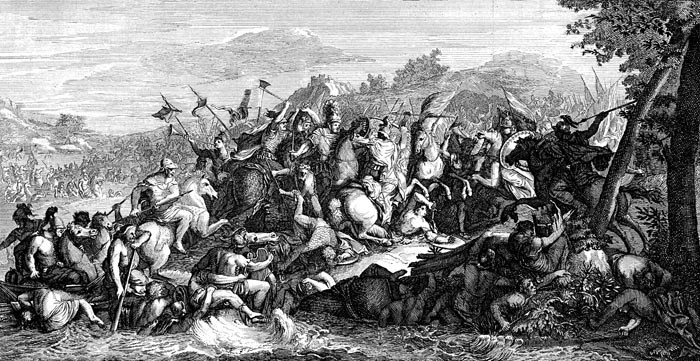
‘Battle of the Granicus’
Anonymous, Charles Le Brun, 1634 - 1740
The Rijksmuseum
Alexander committed crimes: his mind could not withstand the intoxication of success; but with what magnanimity he purchased his life’s errors! His crimes were forever expiated by his tears; all, as regards Alexander, emerged from his innards. He began and ended his career with two sublime comments. Leaving, to fight Darius, he distributed his territory to his generals: ‘What then shall you keep?’ the latter cried in amazement – ‘Hope!’ – ‘To whom do you leave the empire?’ those same captains asked as he lay dying –‘To the most worthy!’ Let us set between those two comments the conquest of the world, achieved with thirty-five thousand men in less than ten years, and let us agree that if any man seemed as a god among men, it was Alexander. His untimely death even added something divine to his memory; because we always see him as young, beautiful, triumphant, with none of those infirmities of body, with none of those reversals of fortune that age and time bring. The divinity vanishes, and mortal men cannot sustain the burden of his work. ‘His empire,’ says the prophet ‘is given to the four winds of heaven’ (Daniel:11:4)
We stopped for three hours at Sousonghirli, and I spent the whole time contemplating the Granicus. It is deeply incised; its western bank is steep and rocky; the water, bright and clear, flows over a bed of sand. The water, in the place where I saw it, was little more than forty feet wide, by three and a half deep, but it rises during the spring, and flows impetuously.
We left Sousonghirli at two in the afternoon; we crossed the Granicus, and advanced into the plain of Mikalicie (Tournefort writes it Michalicie), which was within ancient Mysia. We slept at Tehutitsi, which may be Tournefort’s Squeticui. We found the khan full of travellers; we established our camp under large willows, planted in a quincunx.
On the 11th of September, we started at daybreak, and leaving the road to Bursa on our right, we continued to ride through a plain covered with dry reeds, where I noted the remains of an aqueduct.
We arrived, at nine in the morning, at Mikalitza, a large Turkish city, sad and dilapidated, situated on a river to which it gives its name. I am uncertain if this is the river that emerges from Lake Abouillona: what is certain is that a lake is visible on the plain. In this case, the river near Mikalitza would be the Rhyndaque, formerly the Lycus (Pliny: Natural History:V:XLI), which had its source in the Stagnum Artynia, especially as, exactly at its mouth, is the small island (Besbicos) indicated by the ancients. The city of Mikalitza is not far from the Lopodion of Nicetas (Choniates); which is the Loupadi of Spon; the Lopadi, Loubat and Ouloubat of Tournefort. Nothing is more tiresome for a traveller than this confusion in the nomenclature of places; and if I make errors, in this regard, which is almost inevitable, I ask the reader to remember that more knowledgeable men than I have been mistaken therein. (Even as I make such speculations, there may be some geographical or other work, in which the issues I consider are clarified. It is not that I have neglected what I ought to know. The main authorities are essential: but am I required to read the new works printed in Europe every year? I have unfortunately read too many. Among the modern works on geography, I must note, however, the Précis de la géographie universelle, of Conrad Malte-Brun, an excellent work exhibiting very rare scholarship, wise criticism, fresh insights, and a clear intelligent style which always conforms to the subject.)
We left Mikalitza at noon, and descended, following the eastern bank of the river, towards the high ground forming the coast of the Sea of Marmara, formerly Propontis. To my right I saw a vast plain, a large lake and, far-off, the Olympus range: the whole of that region is magnificent. After riding for an hour and a half, we crossed the river on a wooden bridge, and reached the gorge cutting through the heights before us. There we found the landing-place or harbour of Mikalitza; I dismissed my rogue of a guide, and secured my passage on a Turkish boat about to depart for Constantinople.
At four in the afternoon, we began to descend the river: it is forty-eight miles from the landing-place at Mikalitza to the sea. The river had become a flood, as wide as the Seine; it ran between green slopes that bathed their feet in its waters. Our galley’s ancient nature; the passengers’ oriental clothing; the five half-naked sailors who dragged us along on a rope; the beauty of the river, and the solitude of the hills, rendered the journey pleasant and picturesque.
As we neared the sea, the river made a long canal behind us, at the end of which we could see the hills we had left behind us, their slopes dyed by the setting sun which was hidden from sight. Swans floated in front of us, and herons sought their usual retreats along the banks. It reminded me, strongly, of the rivers and scenery in America, when at evening I would quit my bark canoe, and light a fire on an unknown shore. Suddenly the hills between which we floated withdrew to right and left, and the sea opened before us. At the foot of the two promontories lay half-drowned lowland, formed by the river’s alluvial deposits. We moored alongside this wet marshy land, near a hut, the last khan in Anatolia.
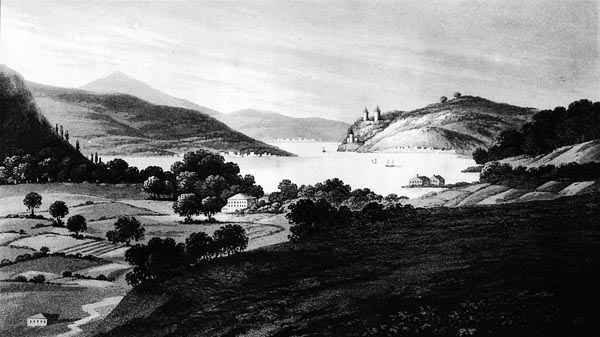
‘The Bosphorus from the Giant's Mountain’
Travels to and from Constantinople in the years 1827 and 1828 - Charles Colville Frankland (p225, 1829)
The British Library
On the 12th of September, at four in the morning, we weighed anchor; the wind was gentle and favourable, and in less than half an hour we found ourselves at the end of the estuary. The view deserves to be described. Dawn was to our right beyond the continental heights; to our left stretched the Sea of Marmara; the bow of our boat pointed towards an island; the sky to the east was bright red, turning paler as the light increased; the morning star shone amidst this purple light and, beneath that lovely star, the crescent moon could just be seen, like the slenderest of strokes made by a brush: the ancients would have said that Aphrodite, Artemis and Eos, the Dawn, came to announce the brightest of gods. The scene changed as I watched; soon rays of pink and green, emanating from a single centre, ascended from the east to the zenith: the colours faded, renewed; faded again, until the sun, appearing on the horizon, blended all the shades of sky in a universal lightly-gilded whiteness.
We sailed north, leaving the coast of Anatolia to our right; an hour after sunrise, the wind died, and we progressed by the use of oars. The calm lasted all day. The sunset was cold, red, and without any variation of light; the opposite horizon was grey, the sea leaden and free of birds; the distant shores seemed azure, but lacked brightness. Dusk was not prolonged, and was suddenly replaced by the night. At nine, an easterly wind rose, and we made good progress. On the 13th of September, as dawn returned, we found ourselves on the coast of Europe, opposite the harbour of Saint-Etienne: the coast was low and barren. It was two months to the day, almost to the hour, that I had left the capital of a civilized nation, and was now about to enter the capital of a barbarous people. How many things had I not witnessed in that short space of time! How those two months had aged me!
At half-past six, we passed the powder-magazine, a long white building, Italianate in style. Behind this monument lay Europe: the land appeared flat and uniform. Villages, proclaimed by a few trees, were scattered here and there; it was a landscape like that of Beauce after the harvest. Beyond the tip of this land, which curved in front of us as we passed, we saw a few of the minarets of Constantinople.
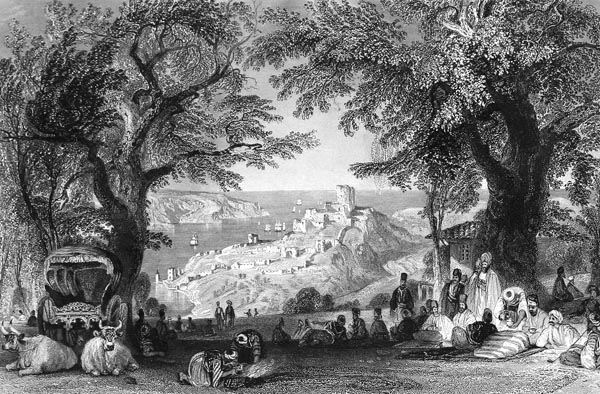
‘Entrance to the Bosphorus from the Black Sea’
Constantinople: and the Scenery of the Seven Churches of Asia Minor - Thomas Allom, Robert Walsh (p140, 1839)
Internet Archive Book Images
At eight, a caique came alongside: as we were almost becalmed, I left the felucca and embarked with my people in the small boat. We rounded the tip of Europe, where stands the Castle of the Seven Towers (Yedikule), an old Gothic fortress crumbling to ruins. Constantinople, and especially the coast of Asia Minor, were both drowned in fog: the minarets and cypresses I could see through the mist had the appearance of a despoiled forest. As we neared the headland of the Seraglio, a northerly wind rose, and within a few minutes blew spreading mist across the scene; I suddenly found myself amongst the palaces of the Commander of the Faithful: at a stroke of a genie’s magic wand. Before me the Black Sea Canal wound between smiling hills like a resplendent river. To my right lay the soil of Asia Minor, and the town of Scutari (Uskudar); Europe was on my left: forming, as it widened, a wide bay full of large ships at anchor, and traversed by innumerable small boats. This bay, enclosed between two shores, presented opposite one another, as in an amphitheatre, Constantinople and Galata. The immensity of these three cities, juxtaposed one with another; Galata, Constantinople and Scutari; the cypress-trees, the minarets, the elevated masts of vessels jostling together; the verdure of the trees; the red and white of the houses; the sea extending its blue cloth below these objects, and the sky unrolling another field of azure above; all this I admired. It is no exaggeration to say that Istanbul offers some of the most beautiful views in the world (though I prefer the Bay of Naples).
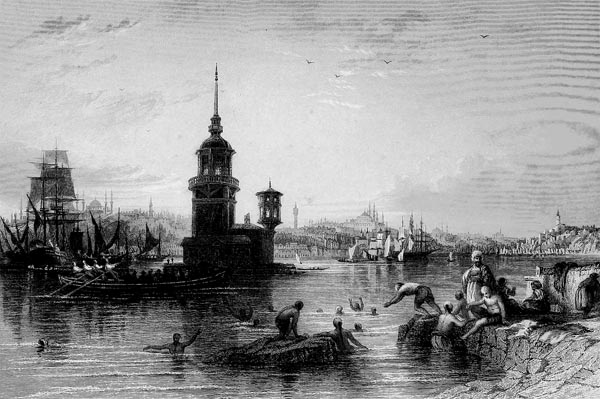
‘Kiz-Koulasi - Leander's, or the Maiden's Tower’
Constantinople: and the Scenery of the Seven Churches of Asia Minor - Thomas Allom, Robert Walsh (p211, 1839)
Internet Archive Book Images
We landed at Galata: I remarked on the continuous bustle along the wharves, and amongst the crowd of porters, merchants and seamen: the latter proclaiming by the varied colours of their faces;, the differences in their language; their clothes, robes, hats, caps, and turbans, that they had come from all the regions of Europe and Asia Minor to inhabit this frontier of two worlds. The almost total absence of women, the lack of wheeled vehicles, and the packs of masterless dogs, were the three distinctive features that first struck me on entering this extraordinary city. Since the people hardly ever walk except in slippers, since there is no sound of carts or carriages, since there are no bells, and hardly any tradesmen employing hammers, the silence is unbroken. You see around you a crowd of mutes who seem to wish to pass by without being noticed, and have the air of escaping the gaze of their masters: you pass without a break from a bazaar to a cemetery, as if the Turks are only there to buy and sell, and to die. The cemeteries, without walls, and set in the streets, enclose beautiful groves of cypress-trees: doves nest in these cypresses, and partake of the peace of the dead. Here and there, one finds ancient monuments, which bear no relation either to the modern humans, or to the new buildings, by which they are surrounded: they appear as if transported to this eastern city by the power of some talisman. No sign of joy, no appearance of happiness reveals itself to your eyes: what you see are not people, but a herd that an Imam leads and a Janissary slaughters. There is no pleasure, but debauchery; no punishment, but death. The sad sounds of a mandolin sometimes emerge from the depths of a coffee-house, and you see wretched children performing shameful dances in front of various species of monkeys, sitting around them, on small tables. From the midst of prisons and bath-houses rises the Seraglio, the Capitol of servitude: it is there that a sacred guardian carefully preserves the germs of plague, and the primitive laws of tyranny. Pale worshippers prowl constantly around the temple, bearing their lives to the idol. Nothing can restrain them from self-sacrifice; they are drawn there by a fatal power; the despot’s eyes attract slaves, as the eyes of a snake fascinate the birds which it preys on.
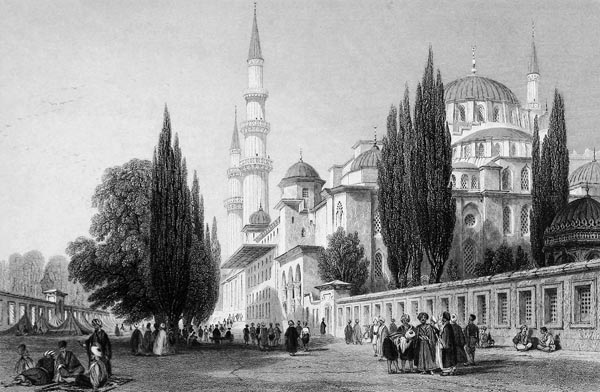
‘The Solimanie, or Mosque of Sultan Soliman’
Constantinople: and the Scenery of the Seven Churches of Asia Minor - Thomas Allom, Robert Walsh (p74, 1839)
Internet Archive Book Images
There are so many descriptions of Constantinople it would be folly for me even to speak of it (you may consult Stephen of Byzantium; Petrus Gyllius’s Topographia Constantinopoleos; Charles Du Fresne Du Cange’s, Constantinopolis Christiana; Sir James Porter’s Observations on the religion of the Turks; Ignatius Mouradgea d’Ohsson’s, Tableau Général de l’Empire Othoman; the Reverend James Dallaway’s Constantinople Ancient and Modern; Paul Lucas, Thévenot, Tournefort; and finally Antoine Ignace Melling’s Voyage pittoresque de Constantinople et des rives du Bosphore). There are several inns in Pera (Beyoglu) which resemble those of the other cities of Europe: the porters who took possession of my baggage took me to one of these inns. I went from there to the French Embassy. I had formerly had the honour, in Paris, of meeting General Sébastiani (Horace Sébastiani ), Ambassador of France to the Porte: he not only desired to insist that I eat every day at the Embassy, but it was only on my earnest prayer that he permitted me to remain at the inn. The brothers Franchini, the premier dragomans at the Embassy, obtained, by order of the General, the firmans I needed for my trip to Jerusalem; the ambassador added letters addressed to the Custodian of the Holy Land (the head of the Franciscans there) and our consuls in Egypt and Syria. Fearing that I might run short of money, he allowed me to draw on him bills of exchange payable on sight, wherever I might need them; finally uniting to these services, of the first magnitude, his polite attentions, he wished to show me Constantinople himself, and took the trouble to accompany me to see the most remarkable monuments. His aides and the entire legation showered me with so many civilities, that I was really quite overcome: it is my duty to witness here my gratitude to them.
I do not know how to speak of one other person whom I ought to have mentioned first. Her extreme kindness was accompanied by a sad and moving grace which seems to have been a premonition of the future: as of then, she was still happy, and a special circumstance further increased her happiness. I myself took part in that joy, which should now be changed to mourning. When I left Constantinople, Madame Sébastiani (Fanny Franquetot de Coigny) was full of health, hope and youth; and I had not yet returned to our country, before she could no longer read my expression of gratitude:
………...Troia infelice sepultum
Detinet extremo terra aliena solo.
...unhappy Troy holds your grave,
in the furthest soil of an alien land.
(Catullus:68b:lines 57-58)
There was, in Constantinople, at that very moment, a deputation of priests from the Holy Land; they had come to claim the protection of the Ambassador against the tyranny of the governors of Jerusalem. The priests gave me letters of recommendation for Jaffa. By another fortunate chance, I found that the vessel that carried Greek pilgrims to Syria was about to leave. It was in the roads, and set to sail with the first fair wind; so that even if my journey via the Troad had succeeded, I would have missed my connection for Palestine. A bargain was soon concluded with the captain. The Ambassador himself brought on board the most sought-after provisions. He gave me as interpreter a Greek named John, a servant of the Messieurs Franchini. Showered with attentions, prayers and wishes, on the 18th of September, at noon, I was conducted aboard the pilgrim ship.
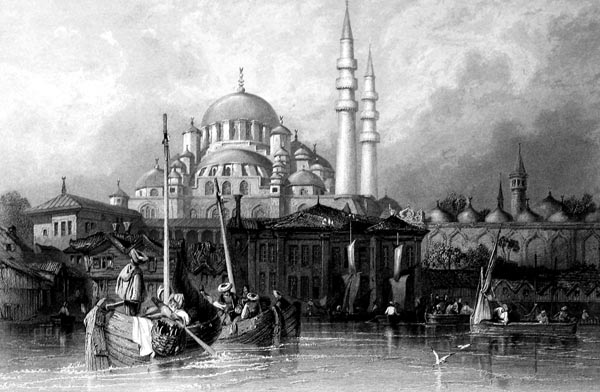
‘The Mosque of Yeni Jami’
Constantinople: and the Scenery of the Seven Churches of Asia Minor - Thomas Allom, Robert Walsh (p119, 1839)
Internet Archive Book Images
I confess that I was sorry to leave hosts of such rare sympathy and politeness, yet I was glad to leave Constantinople. The feelings one experiences in that city, despite oneself, spoil its beauty; when one considers that those shores were once inhabited only by Greeks of the Later Empire, and are now occupied by the Turks, one is shocked by the contrast between people and place; it seems that such vile slaves and such cruel tyrants ought never to have dishonoured so wonderful a location. I had arrived in Constantinople on a day of revolution: the rebels of Rumeli had reached the gates of the city. Obliged to bow before the storm, Selim III had dismissed, and exiled, those ministers unacceptable to the Janissaries: every moment the sound of cannon was expected, announcing the fall of those proscribed. As I contemplated the trees and buildings of the Seraglio, I could not help pitying the master of this vast empire (Selim’s unhappy end justified that pity only too well.)
Oh, how wretched despots are in the midst of their happiness, how weak amidst their power! How pitiful it is that they cause so many to shed tears, while never being certain of not shedding their own; without being able to enjoy that sleep of which they deprive the unfortunate! My stay in Constantinople weighed on me. I only like to visit places embellished by the virtues or the arts, and I could find, in that land of Phocas and Bajazet neither the one nor the other. My wishes were soon fulfilled, since we weighed anchor on the same day I boarded, at four in the afternoon. A northerly wind filled our sails, and we set out for Jerusalem under the banner of the cross, which floated from the mast of our vessel.
End of Part Two